Young women fear return to a broken land of rubble and brutality

It’s 10 years since Islamic State militants tried to wipe out the Yazidi people in the Sinjar region in northern Iraq. They massacred thousands of men, and raped and enslaved girls and women. Now survivors face a new fear as the Iraqi government plans to close down the tented camps where they live, in other parts of the country, to encourage them to return to the areas they fled from.
Several Yazidi women who survived the horrors and live in an affected camp have been in the UK for a series of choral performances, seeking to showcase their cultural heritage and highlight the plight of their community, which is an ancient religious and ethnic minority.
Tears slide silently down Amira’s cheeks as she tells the BBC of the horrific brutality inflicted by the militants when they captured the Yazidis’ ancestral homeland in 2014. A decade has passed, but her pain remains raw.
Warning: This article contains graphic descriptions of violence
Amira managed to flee to the mountains as men from her community were shot dead and women and girls were raped and enslaved.
But two of her sisters were among those put to work in the households of Islamic State (IS) fighters, who had declared the Yazidis to be devil-worshippers.

Unlike many slaves Amira’s sisters weren’t raped, she says, because they were already married.
However, one sister, whose husband had been killed by the militants, was beaten on a daily basis.
And she received an unspeakably cruel threat.
“She had given birth 15 days before she was captured, and they said to her: ‘We will kill your baby and force you to eat his flesh',” Amira says.
Her voice drops to a near-whisper as she describes how her other sister, Delal - who was pregnant when she was captured - lost her baby daughter at the age of five months because she couldn’t produce milk to feed her. Delal tried to kill herself but was stopped by her four-year-old son. “Her child was only four years old,” says Amira. “And he said to her, ‘Mum, please don’t kill us. Let’s get out of here.’”
When she later took a tomato from the fridge to feed him, she and her two surviving children were locked in a room for a week as punishment, with no food and only a small bottle of water and carton of milk.

The Iraqi government’s plans to close down the camps where tens of thousands of Yazidis have been living since 2014 is a frightening prospect for many of them.
The limited services currently provided within the camps are due to be cut off by the end of July, with grants for them to return to the region of Sinjar, where the massacres took place.

“The situation is very dangerous,” Vian Dakhil, the only Yazidi MP in the Iraqi parliament, told the BBC. “There are a lot of armed groups there and the Iraqi government forces are weak.”
Much of the town of Sinjar is still rubble, she says. “There are no houses, no schools, no hospitals, no anything.”
The UN refugee agency (UNHCR) has echoed their concerns, saying there should be no forced closure of the camps. “No-one should be made to return to a place where they may be at risk of irreparable harm, or not have access to basics like water, healthcare, housing and jobs to help them resume a decent life,” says Farha Bhoyroo, the agency’s spokesperson in Iraq.
The agency says that it is worried that some of those displaced from Sinjar may end up with no option but to stay in the decommissioned camps.
Amazing week with @AMARLondon Yazidi women’s choir pic.twitter.com/q8X72bvXLN
— AMAR International (@AMARLondon) June 28, 2024
Hadiya, 28, who was also part of the choir visit organised by the Amar Foundation charity, told the BBC that, before 2014, she had “everything – including a very big house”.
Now she and her family live in a tent, just 4m (13ft) long and 3m wide, “like prisoners”. It’s blisteringly hot in the summer and cold in the winter. But at least, there, she feels safe.

Hadiya too is still haunted by terrible memories – including what happened to her cousin, Ghazal.
Ghazal was taken captive at the age of eight and, two years later, forced to marry. When she was rescued in 2020, at the age of 14, Hadiya says she was raising two children whom she had to leave behind – and had been brainwashed into thinking the Yazidis were “bad people”.
Ghazal, now 18, remains disturbed and withdrawn. Her older sister – who would now be 19 – is one of hundreds of women and girls who are still missing.
“No-one is asking for them,” Zahra Amra, office manager of the Amar Foundation in Dohuk, complains bitterly. She's also in the UK with the singers, acting as translator.
“No-one is helping us search for our sisters. Too many Isis fighters have been released from prisons. When IS came no-one helped us and now they want us to go back to Sinjar.”

In August 2014, Zahra lost classmates and friends. Her grandmother was shot dead because she was too frail to make it up Mount Sinjar where tens of thousands of Yazidis fled as IS advanced.
But most of all, she says, she lost the future that she and her friends had been planning, and the collective trauma and sense of abandonment run deep.
“We don’t feel safe,” she says. “And we don’t trust anyone.”
The Yazidi women's peace choir can be heard performing on BBC Radio 3's Music Planet, available on BBC Sounds.


